 Pekin Bantam
Pekin Bantam
 Pekin bantams
are a Chinese True bantam, a breed of miniature chicken which has no large
version. The first Pekins are
believed to have been taken from the private collection of the Emperor of China
at Peking (now known as Beijing) by British soldiers towards around 1860.
However, some sources suggest that a consignment of birds from China around
1835 were given to Queen Victoria, and that these birds were bred with further
imports and were developed into the breed we know today as Pekin Chickens.
Pekin bantams
are a Chinese True bantam, a breed of miniature chicken which has no large
version. The first Pekins are
believed to have been taken from the private collection of the Emperor of China
at Peking (now known as Beijing) by British soldiers towards around 1860.
However, some sources suggest that a consignment of birds from China around
1835 were given to Queen Victoria, and that these birds were bred with further
imports and were developed into the breed we know today as Pekin Chickens. Pekin bantam look like a miniature version of Cochin chickens and are often known in the United States and Canada as Cochin Bantams. However, they are unrealted.
Pekin bantams possess a wealth of feathering abo ...

 Penedesencas
Penedesencas
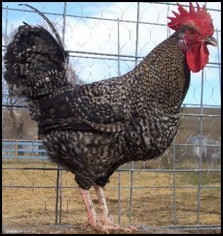 Penedesencas are
Spanish chickens that are best known for laying large qualities of brown eggs.
In fact, no other breed can produce eggs as dark as the Penedesenca can. They
are a rare breed, though they still work well as a meat bird due to their
hearty build.
Penedesencas are
Spanish chickens that are best known for laying large qualities of brown eggs.
In fact, no other breed can produce eggs as dark as the Penedesenca can. They
are a rare breed, though they still work well as a meat bird due to their
hearty build.They have a very unique comb that starts as a single comb but splits into multiple combs near the back of the head. They have red ear-lobes with white centers despite laying brown eggs, red combs, and red wattles. There are four varieties, the Wheaten, the Partridge, the Crele, and the Black, each with slightly different color schemes, all with black beaks and legs, save for the Crele which has white beaks and legs.
Penedesenca chickens are a very ac ...

 Pepoi
Pepoi
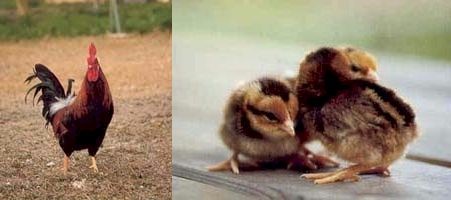 Pepoi is a bantam
breed. They are very common in Veneto and Friuli (North-East Italy). They are probably
the only Bantam rustic breed used for production. Pepoi can be easily reared
and are a good solution for the production of portion chicken. The breast has
good pectoral muscles, excellent for the spit; the meat is very tasty.
Pepoi is a bantam
breed. They are very common in Veneto and Friuli (North-East Italy). They are probably
the only Bantam rustic breed used for production. Pepoi can be easily reared
and are a good solution for the production of portion chicken. The breast has
good pectoral muscles, excellent for the spit; the meat is very tasty.Mean laying: 160-180 (rose shell, 40-45 g).Great broodiness and aptitude to chicks care.
Content and photo source: Agraria.org

 Phoenixe
Phoenixe
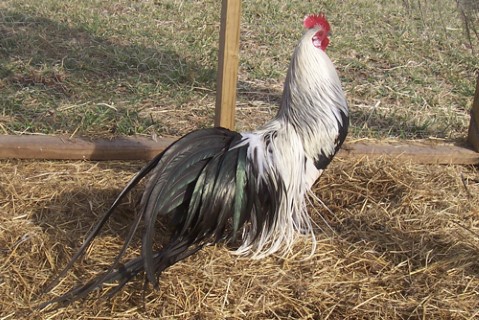 Phoenixes are
a show bird more than anything; they are extremely poor egg layers and their
body structure doesn''t make them very good fryers. Phoenix Chickens are best
known for their tail, which can grow to almost absurd proportions. They have an
average-sized single comb and medium length wattle, both a light red color.
Their colorings can various wildly from silver to black to gold to red to
brown. Their legs and beak are typically a light gray color.
Phoenixes are
a show bird more than anything; they are extremely poor egg layers and their
body structure doesn''t make them very good fryers. Phoenix Chickens are best
known for their tail, which can grow to almost absurd proportions. They have an
average-sized single comb and medium length wattle, both a light red color.
Their colorings can various wildly from silver to black to gold to red to
brown. Their legs and beak are typically a light gray color.
Phoenixes do well in confinement, which is good because they''ll need lots of codling due to their tail feathers. Their attitudes range from shy and calm to aggressive and in-your-face. Generally though they aren''t very friendly and don''t like to be pestered. ...

 Pita Pinta Austuriana
Pita Pinta Austuriana
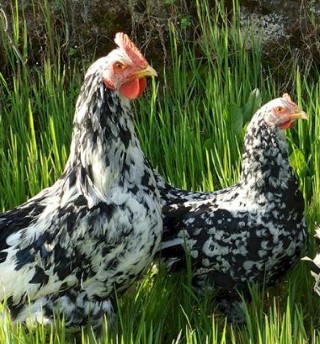 Pita Pinta Austuriana
chickens, also known as Asturian Painted Hen ,
belongs to the Atlantic branch of domestic chickens and has common ancestry
with other breeds in northern Spain, such as the Euskal Oiloa of the Basque
Country. Their name comes
from the Asturian language, in which pita means "hen" and pinta
meaning "painted" or “mottled”.
Pita Pinta Austuriana
chickens, also known as Asturian Painted Hen ,
belongs to the Atlantic branch of domestic chickens and has common ancestry
with other breeds in northern Spain, such as the Euskal Oiloa of the Basque
Country. Their name comes
from the Asturian language, in which pita means "hen" and pinta
meaning "painted" or “mottled”.
With the industrialization of egg production in Asturias in the 1950s and 1960s, the number of Pita Pinta Austuriana chickens dropped dramatically, almost to the point of extinction. They started to recover between 1980 and 1990. A breeders'' association, the Asociación de Criadores de la Pita Pinta Asturiana, was founded in 2003; its 52 members have a total of 1842 birds. In 2 ...

 Plymouth Rock
Plymouth Rock
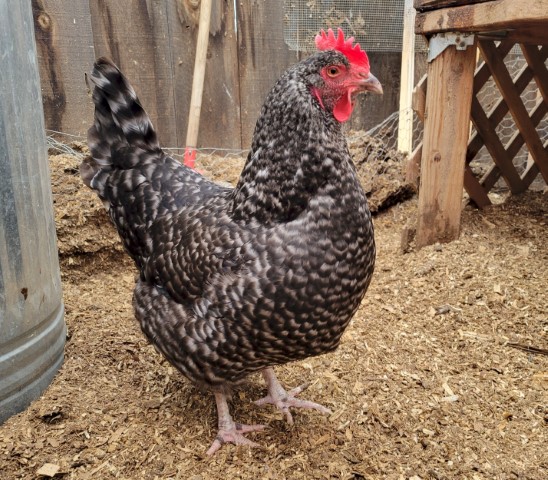 Plymouth Rock chickens were developed in New England in the middle of the 19th century as a dual-purpose fowl, meaning that they are valued both for their meat and for the hens'' egg-laying ability. The first Plymouth Rock was barred and other varieties were developed later.
Plymouth Rock chickens were developed in New England in the middle of the 19th century as a dual-purpose fowl, meaning that they are valued both for their meat and for the hens'' egg-laying ability. The first Plymouth Rock was barred and other varieties were developed later.Plymouth Rock chickens were first exhibited as a breed in 1849. Several people claimed its invention, using crosses of Dominiques, Black Javas, Cochins, and perhaps Malays and Dorkings. John C. Bennett (1804–1867) has been credited with either creating or popularizing the breed.
Plymouth Rock chickens became popular very rapidly, and until World War II no breed was as popular in the United States as the Barred Plymouth Rock. They became so widely ...

 Polish
Polish
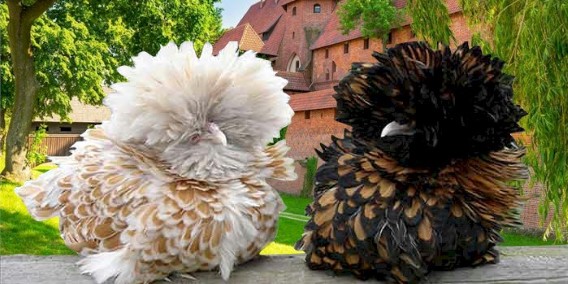 Polish (also known as Padovana of Chili or Polish Frizzles), chickens have a huge
bouffant crest of feathers and a v-shaped comb.
Polish (also known as Padovana of Chili or Polish Frizzles), chickens have a huge
bouffant crest of feathers and a v-shaped comb. Though the derivation of the Polish breed is unclear, one theory suggests that their ancestors were brought by Asian Mongols to Eastern Europe during medieval times, and thus, could have originated in Poland. It is also believed that immigrants could have brought the breed''s predecessors from Spain or Italy in the late 16th century. The Polish was standardized in the Netherlands and declared a thoroughbred in the 16th century. Chickens bearing a strong resemblance to the Polish can be seen in paintings from the 15th century, and they were extensively portrayed in Dutch and Italian paintings ...

 Poltavas
Poltavas
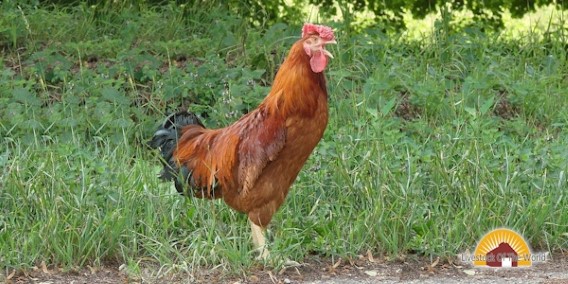 Poltavas are
an old Ukrainian dual-purpose chicken named after the Ukrainian city of
Poltava. It is believed that they were developed from local chicken breeds.
Poltavas are
an old Ukrainian dual-purpose chicken named after the Ukrainian city of
Poltava. It is believed that they were developed from local chicken breeds.
They are found in Clay (the most common), Cuckoo, and Black. The tips of their flight feathers are black and their tail is brown-black. Roosters have a lighter neck than hens. Chicks are covered in light brown fuzz. They are very resistant and adapt easily to any conditions. The rooster weighs about 3 kg, and hens weigh about 2 kg. They lay around 160-215 brown eggs per year.
They are mainly used small ranches since their egg product and size is not attractive for commercial use.

 Polverara
Polverara
 Polverara chickens stand as a testament to Italy''s rich poultry heritage, originating from the ancient village of Polverara in the Padua region. Dating back to the 15th century, they are also known as "Padovana di Polverara," "Schiatta di Polverara," or simply "Schiatta." There''s a debate among poultry historians about whether Polverara chickens are the ancestors of the Padovana breed or vice versa, highlighting their historical significance in Italian poultry breeding.
Polverara chickens stand as a testament to Italy''s rich poultry heritage, originating from the ancient village of Polverara in the Padua region. Dating back to the 15th century, they are also known as "Padovana di Polverara," "Schiatta di Polverara," or simply "Schiatta." There''s a debate among poultry historians about whether Polverara chickens are the ancestors of the Padovana breed or vice versa, highlighting their historical significance in Italian poultry breeding.
Despite their storied past, Polverara chickens faced near-extinction at one point, with their numbers dwindling. However, efforts are underway to revive this heritage breed, and it is officially recognized as a traditional product by the Italian Department of Ag ...
